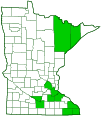Painted harvestman
(Odiellus pictus)
Conservation • Description • Habitat • Ecology • Distribution • Taxonomy
Conservation Status |
|||
| IUCN Red List | not listed |
||
| NatureServe | not listed |
||
| Minnesota | not listed |
||
Description
Painted harvestman is a common, easily recognized harvestman. It occurs in the United States from Maine to northern Georgia, west to Minnesota and Alabama.
Adults are active from June through October. They are found in forests on tree trunks, on bark or beneath loose bark, on rocks, boulders, and other vertical surfaces, and they are often found in leaf litter.
Males are about 3⁄16″ (5 mm) in length. The body is soft, compact, oval, and brown.
There are two simple eyes and no compound eyes. The eyes are mounted on a small, rounded protuberance (ocular tubercle). There are three long, forward-projecting spines at the middle of the front margin of the carapace, in front of the ocular tubercle. There are also large spine-like projections on the ocular tubercle.
The abdomen is tapered in the rear to a narrowly rounded tip. There is a large, distinct, dark, central figure bordered by lighter areas extending from the eye area on the carapace to the end of the abdomen.
The legs are banded, slender, and long, but relatively short for a harvestman. The second pair of legs is the longest. Each leg consists of a coxa, trochanter, femur, patella, tibia, metatarsus, tarsus and claw. There are large, spine-like projections on the coxae and trochanters.
Females are larger, about ¼″ (6 mm) in length. The abdomen is broadly rounded in the rear. The central figure on the abdomen is lighter and sometimes indistinct.
Size
Female Body Length: about ¼″ (6 mm)
Male Body Length: about 3⁄16″ (5 mm)
Legspan: variable
Similar Species
The three spines at the middle of the front margin of the carapace, along with the relatively short legs, distinguish painted harvestman from all other harvestmen in Minnesota.
Habitat
Forests
Ecology
Season
June through October
Behavior
They move slowly compared to other harvestmen.
Life Cycle
Food
Distribution |
||
|
Sources
|
|
| 10/31/2025 | ||
Occurrence |
||
Common |
||
Taxonomy
Class
Order
Suborder
Eupnoi
Superfamily
Phalangioidea
Family
Phalangiidae
Subfamily
Oligolophinae
Genus
Odiellus
Subordinate Taxa
Synonyms
Lacinius ohioensis
Lacinius texanus
Mitopus ohioensis
Mitopus pictus
Oligolophus ohioensis
Oligolophus pictus
Phalangium pictum
Common Names
painted harvestman
Glossary
Carapace
The hard, upper (dorsal), shell-like covering (exoskeleton) of the body or at least the thorax of many arthropods and of turtles and tortoises. On crustaceans, it covers the cephalothorax. On spiders, the top of the cephalothorax made from a series of fused sclerites.
Coxa
The first (most proximal) segment of the legs of most arthropods, including all insects, spiders, and crustaceans, and most arachnids. It attaches the leg to the body and connects to the trochanter. Plural: coxae.
Tubercle
On plants and animals: a small, rounded, raised projection on the surface. On insects and spiders: a low, small, usually rounded, knob-like projection. On slugs: raised areas of skin between grooves covering the body.
Visitor Photos
Share your photo of this arachnid.
This button not working for you?
Simply email us at info@MinnesotaSeasons.com.
Attach one or more photos and, if you like, a caption.
Alfredo Colon |
||
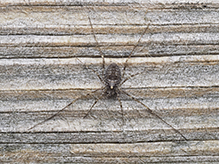 |
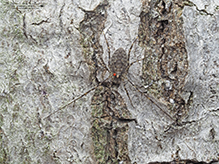 |
|
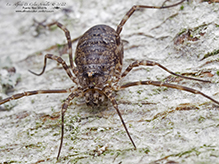 |
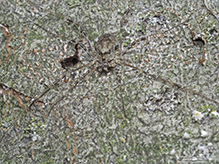 |
|
MinnesotaSeasons.com Photos
|

Slideshows

Visitor Videos
Share your video of this arachnid.
This button not working for you?
Simply email us at info@MinnesotaSeasons.com.
Attach a video, a YouTube link, or a cloud storage link.
Other Videos

Visitor Sightings
Report a sighting of this arachnid.
This button not working for you?
Simply email us at info@MinnesotaSeasons.com.
Be sure to include a location.
MinnesotaSeasons.com Sightings

